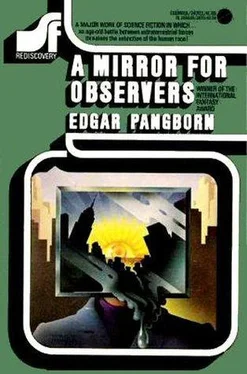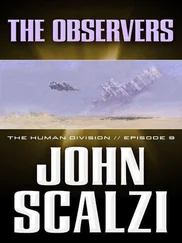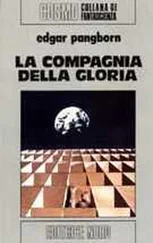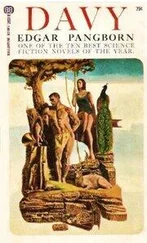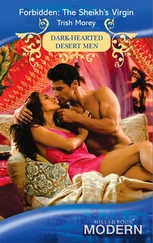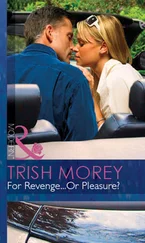Angelo had been here with Feuermann before. I would have gone all the way with Jacob to the grave, but Angelo shook his head and led me to a green bank overlooking the most ancient part of the graveyard — quite ancient in the American-human sense, for some of the crumbling stones dated from three hundred years ago when I was a boy. Angelo pointed those out to me, not snickering as most youngsters would have done at the labors of a long-dead stonemason who symbolized angels by eyed circles with a few gouges for hair. “Guess all they had was that sandstone or whatever it is.”
“Yes, marble would have done better by a few centuries.”
“Sure.” He did laugh then. “Sure, what’s a few centuries?” He sat on the bank, chewing a grass blade, swinging his feet. Jacob Feuermann was fifty paces away, seeming on his island of contemplation more distant than he was, full of stillness, with sunlight on his white head. He looked down at whatever truth he saw in that modest swell of earth, and then away toward summer clouds and eternity. In a younger man it might have appeared morbidly sentimental, at least to human beings, always swift with labels for the quirks of others. But Feuermann was too solid, too tranquil inwardly, to worry over labels. Later he sat on the ground, chin in hand, unconcerned about dampness or creaky aging joints, and Angelo murmured to me: “Every Sunday rain or shine. Sure, even if it’s raining, though maybe he doesn’t sit on the grass then. Winter too.”
“I suppose he loved her, Angelo. Likes to be here where nothing much comes between him and the thought of her.” But I was losing myself in shadow. My mind smelled chloroform, saw that blank-faced young Hercules looming over Sharon in the doorway, glimpsed a gray coupe that should not have hung behind us. Small things. Nothing ugly had happened except Bella’s death; the warm sweetness of this day made it seem absurd that any more ugliness could happen. But even in a sunlit hush of jungle you may see some distant fluid motion of black and orange stripes in the grass, or hear the whisper of a leaf no wind disturbs. I produced a yawn and hoped it sounded comfortable, lending a phony casualness to my question: “You go to church, Angelo?”
“Sure.” Though mild, his face became too watchful. Probably he knew the question was not casual, knew I was groping for his thoughts and wondered whether to grant me the right to any such exploration…. “I even sang in the choir last year. Kid in front of me had ears like an aardvark. Threw me off pitch.” He hummed, a clear contralto with a curious effect of distance: “ Ad Deum qui laetificat juventutem meam—” he spat out the grass blade and smiled off at nothing.
“And has he made your youth joyful?”
Angelo chuckled. “Now you sound like that man I talked with in the park. He said religion was a fraud.”
“I don’t consider it a fraud, though I happen to be agnostic myself. Matter of individual belief. You should go anyway, if only on your mother’s account — at least I suppose she’s devout, isn’t she?”
He sobered quickly. “Yes….”
“Tell me something about Latimer.” I watched his feet swinging, the finely shaped one, the twisted one with the brace. “Keep thinking I might decide to settle here.”
He spoke doubtfully: “Well, there isn’t much. People say it’s kind of gone to seed. I dunno. Lot of empty houses. Nothing much ever happens. The country’s nice, like here, when you get out in it — Cheepus, I wish I could! You know: just walk all day, climb hills. I go a mile and then it’s pain up the back of the leg, have to quit.”
“Think I’ll get a car. Then we could go out in the country a bit.”
“Cheepus!” He lit up from inside. “Spend a whole day in the woods maybe? I could go for that…. You know, that painting, the one in your room, it wasn’t any place I ever really saw. I’ve seen places like it — birches — Uncle Jacob takes me for drives sometimes. But when I want to get out and walk he has to come along and worry about my leg instead of letting me worry about it and quit when I’m ready to…. I like animals. You know? The little things that — I’ve read, if you sit still in the woods a while they’ll come around and not be afraid.”
“That’s true. I’ve often done it. Most of the birds don’t mind if you do move a little, in fact they prefer it, looks less suspicious. I’ve had orioles come pretty close. Red-wing blackbirds. Fox almost blundered into me once. I was sitting in one of his favorite paths. He just looked embarrassed and made a detour…. Met a friend of yours, by the way. At the delicatessen. Sharon Brand.”
His mind was still in the woods. He said absently: “Yes, she’s a nice kid.”
“You sort of grew up with her?”
“Sort of. Four-five years anyway. Mama — doesn’t like her too much.”
“Oh, why? I think she’s swell.”
He picked a fresh grass blade. He said carefully: “Sharon’s people aren’t Catholics….”
“Is Billy Kell Catholic?”
“No.” He looked puzzled. “Billy? When did I—”
“This morning, Angelo. When we found Bella. You said: ’Billy Kell might know.’”
“Oh. Did I?” He sighed uncomfortably. “Cheepus…!”
“You said something about the Diggers too. What are they? A gang?”
“Yeah.”
“Round about your age?”
“Yeah. Some older.”
“Tough?”
He grinned in a way I hadn’t seen, as if he were trying out toughness to see how it felt. “They think so, Mr. Miles, to hear ’em bat the wind.”
“Sounds as if you didn’t like ’em.”
“They’re a bunch of—” He stopped, weighing me, I think, and wondering if I’d tolerate an obscenity from a twelve-year-old, and deciding against it. He said mildly: “Nobody likes those bastards.”
“What all do they do?”
“Oh, they fight dirty. Some stealing, I guess, fruit-stand jobs or stuff off the back of a truck. Billy says some of the older ones are muggers, and some of ’em carry shivs — knives, I mean.” I didn’t like his smile: it was a dissonance in the character I thought I was beginning to know. “Most of ’em come from the sh — the crumby end of Calumet Street, the south end…. Got a cigarette?”
I gave him one, and lit it for him. Feuermann wasn’t looking, and I suppose I could have argued it with Feuermann anyway. “Don’t the Diggers have any competition, Angelo?”
He hesitated, only a little. “Sure. The Mudhawks. That’s Billy Kell’s gang.” He was smoking casually, inhaling without coughing. “You know, I saw Billy crack a walnut once, just putting it against his biceps and closing his arm. Nobody tangles with Billy Kell.” He said as if trying to convince himself of something that mattered: “The Mudhawks are all right.”
“Can you talk with him? With Billy Kell?”
He knew what I meant, but said uneasily: “How do you mean?”
“When I first saw you, yesterday, you were reading the Crito. I just meant, things like that.”
He said evasively: “Books aren’t everything…. He’s good in school, straight A’s all the time.”
“How is the school? Pretty fair?”
“It’s all right.”
“But you have to put on an act, is that right?”
He rubbed out the cigarette against a stone. He said presently: “They play around an awful lot. Maybe I do. Some of the time. I’m no good in mathematics. Or manual training — honest, you should see a birdhouse I tried to make, looks like a haystack in a blizzard.”
“What are you good at?”
He made a face at me, enjoying it. “The things they don’t teach. All right — like the Crito, Mr. Miles. Philosophy.”
“Ethics?”
“Well, I got a college text on that, out of the library. I didn’t think it got down to cases very much. They’ve got Spinoza there. I didn’t try it.”
Читать дальше
